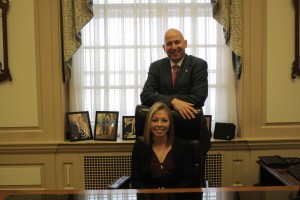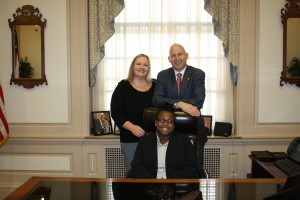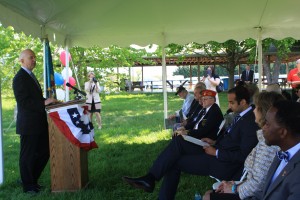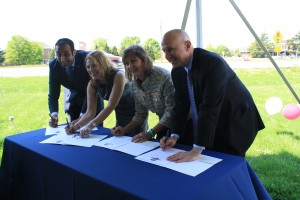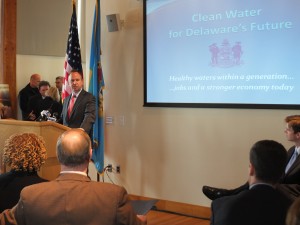Photos from 2016 State of the State Address
Video of the 2016 State of the State Address
Final legislative and policy agenda seeks to leverage skilled workforce, high quality of life to create new opportunities for Delawareans
Dover, DE – In his final State of the State speech, Delaware Governor Jack Markell today proposed an agenda that positions Delaware to leverage its highly trained citizens and welcoming business climate to build opportunities for sustained job creation in an ever-changing economy. 
“It is our responsibility to provide Delawareans with the bridge to the life they want — workforce training for people who want to upgrade their skills; education that aligns with the knowledge they need in the new economy; affordable and high quality health care, safe communities, and more responsive government that supports their drive to succeed,” Markell said. “We have a lot more to do and new adversities to conquer. But our progress demonstrates that we are up to the challenge.”
“When I first stood before you, we faced a collapsing national economy and a growing deficit at a time of rapidly increasing demand for public services. As a result of the recession, more than five percent of Delaware’s jobs vanished. So we all got to work, improving our business climate and making difficult decisions to balance our budgets just as many Delawareans have had to do for their own. And we’ve done so while protecting the most vulnerable among us.”
“When we reflect on the challenges we have faced, we can be proud that even in the wake of the great recession, we did not settle for a return to the status quo.”
The Governor noted Delaware’s substantial progress over the past seven years:
- Since the national economy bottomed out, Delaware’s job growth of 13 percent has outpaced all of our neighboring states, adding more than 50,000 jobs. During the past year alone an additional 13,700 Delawareans have found jobs.
- Thanks to bipartisan compromise, construction workers are being put back on the job through investment of an additional nearly $400 million in roads and bridges over the next decade.
- More students are graduating from high school – the best improvement of any state.
- In 2011, only five percent of low-income kids attended the most highly rated early childhood programs. Today, that number has been increased to 59 percent.
- A $5.6 million state investment in downtown areas in every county is leading to more than $114 million in private investment through the Downtown Development Districts program.
- More veterans are finding jobs while fewer are living on the streets – during the past year, 284 homeless veterans were helped to get off the street.
- Delaware ranks first in helping youth receiving social security disability benefits to successfully transition to employment.
- Delaware’s air is cleaner – Delaware’s carbon dioxide emissions were reduced 16% from 2009 to 2013 – and recreational and cultural opportunities are more plentiful, from 50 miles of new trails to record investments in libraries and the arts community.
- Prisons are less crowded – the statewide detention population has dropped 18 percent in two years and coordinated programs are helping to reduce recidivism.
- Historic steps have been taken toward equality for Delaware’s vibrant LGBT community – legislation was enacted to approve marriage equality, prohibit discrimination based on a person’s sexual orientation, and provide transgender Delawareans the same rights to protection from discrimination and violence.
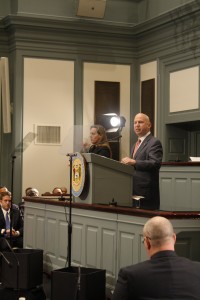 Recently, the Governor’s office issued a series of one-page fact sheets that outline progress that has been achieved during the past seven years on a range of areas. Read those fact sheets HERE.
Recently, the Governor’s office issued a series of one-page fact sheets that outline progress that has been achieved during the past seven years on a range of areas. Read those fact sheets HERE.
“Today, the state of our state is stronger than it has been in years.”
Markell urged lawmakers and other leaders to support several program, policy, and legislative initiatives that build upon the state’s progress and meet the shared expectation that more can be done to move the state forward.
BUILDING ON DELAWARE’S PROGRESS BY EXPECTING MORE
SPEECH EXCERPTS AND PROPOSALS
Growing Delaware’s economy by increasing access to job training
Last year, Markell announced the Delaware Promise, a partnership among the General Assembly, business community, and Delaware schools and colleges, to help ensure that 65 percent of our workforce will earn a college degree or professional certificate by 2025. Today he celebrated the progress of this initiative and announced its expansion.
“We help grow our economy by improving access to better education and training. Even as employment in our state has reached historic highs, we confront the odd reality that Delaware employers are hiring, but can’t find enough qualified applicants.”
- Expand the availability of SEED higher education scholarships by expanding their benefits to part-time students and those who must take a break from their studies.
- Expand the TechHire initiative beyond ZipCode Wilmington and add a new coding program at Delaware Tech, geared toward people who need to work part time while they train
- Grow the Pathways to Prosperity initiative, which will create training opportunities this fall for 5,000 high school students to receive workplace experience and college credits that position them for careers in key industries. Business partners have agreed to double from 500 to 1000 the number of students who have the opportunity to work directly at a Delaware employer.
- Increase the number of students studying computer programming to 1,000 by September, up from 80 two years ago.
Building a more affordable and welcoming place to do business
“Our strong workforce is the most important reason employers locate and expand in our state. But we also know that our employers and entrepreneurs expect Delaware to be an affordable, welcoming place to do business.”
- Enact legislation that helps Delaware businesses use online platforms to offer a stake in their companies to Delawareans. Much of this investing can be done through what is known as crowdfunding – a way for entrepreneurs to connect with investors.
- Modernize our tax code to promote job creation through the Delaware Competes Act.
Sustaining responsible state finances
“Because of the work we have done over the last seven years, we are still one of a handful of states with a AAA credit rating. We have reduced headcount in executive branch agencies by nearly 5 percent, saved millions by changing the way we purchase energy, and renegotiated real estate leases. The biggest challenge we face is the sharply accelerating cost of health care.”
- Build on efforts of the state’s healthcare community to move away from an expensive fee-for-service model and toward a system that emphasizes quality outcomes at an affordable cost.
- Improve the long-term viability of state employee health plans by: giving employees information and better incentives to choose cost-effective, high quality care, like using urgent care instead of the emergency room or telemedicine instead of an office visit; and creating a new plan for future employees to limit changes for current employees.
Investing in quality education
“We have no better example of how higher expectations – along with significant additional resources, support, and innovation – have resulted in extraordinary progress than in our schools. Over the past several years, our students, families, teachers, and staff have set and reached loftier goals in almost every possible way. And the more we have asked, the more they have achieved, like record high graduation rates – improving faster than any other state – while earning some of the nation’s best test scores in the early grades.”
- Better support, retain, and attract high quality teachers by raising starting salaries and introducing opportunities for educators to earn more for taking on leadership responsibilities without leaving the classroom for administrative positions.
- Provide stipends for educators who aren’t receiving compensation for their National Board Certification.
“As much as any other state, Delaware has committed to our youngest learners.”
- Provide funding to give more low-income children access to high-quality early learning programs, well-educated teachers, and a healthy start.
Protecting public safety supporting reentry through common-sense criminal justice reforms
“More than 600 inmates are serving mandatory extended sentences because of Delaware’s habitual offender law. Today, a person can receive a mandatory life sentence solely for drug offenses, without any conviction for an act of physical violence. The cost to taxpayers of these automatic sentences and of keeping habitual offenders behind bars for decades is enormous.”
- Reform sentencing laws to give judges discretion to sentence offenders on a case-by-case basis so that the state can focus limited resources on keeping dangerous offenders off the streets.
- Amend Delaware law to remove the financial bar to exercising the right to vote. Right now, a person with a felony conviction can vote as soon as his or her sentence is complete, but only if he or she has paid all fines and fees.
Professional Licensing
“One way we must make strides towards a more equal society is by ensuring that everyone has a fair chance to build a better life. Many of our licensing and certification requirements are well-founded, however, some requirements may no longer be necessary and instead prevent many from pursuing professions in which they would thrive, particularly low-income individuals.”
- Build on recent reforms to barber and cosmetology regulations by instructing executive branch agencies, along with the Chair of the Joint Sunset Committee to conduct a comprehensive analysis of licensing requirements, with input from board representatives and the public.
Increasing access to safe and effective contraception
“Delaware has one of the highest unplanned pregnancy rates in the country – 57 percent. When people become parents accidentally, we know the outcomes for them and their children, may be diminished. There are new methods that are much more effective than the pill – methods preferred by OB-GYNs and endorsed by the Centers for Disease Control – but here in Delaware our healthcare system doesn’t make it easy to choose these new methods.”
- Launch a partnership with the national nonprofit Upstream USA to train our healthcare providers so that all Delaware women can conveniently access the full range of contraceptive choices at low or no-cost, consistent with federal law, which requires coverage and reimbursement for all contraceptives.
Treating addiction
“We have increased access to substance use treatments by as much as 100 percent, and we’ve made it easier for law enforcement, as well as friends and family, to help victims before it’s too late. These efforts are saving lives. I ask for your continued support in building on our progress.”
- Fund a team of health care professionals who can serve more than 100 of our highest-need patients to provide the intensive services to end their constant cycle of hospitalization, withdrawal, and treatment.
- Develop closer coordination between the Department of Health and Social Services and primary care doctors to screen for and identify more cases of substance abuse to reduce overall treatment costs and save more families from the anguish of a long battle with addiction.
The full remarks of Governor Markell’s 2016 State of the State address are posted at: http://governor.delaware.gov/speeches/2016StateOfTheState/SOTS_2016.pdf
###
